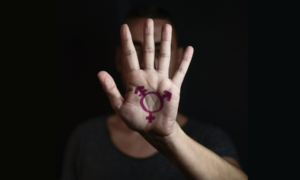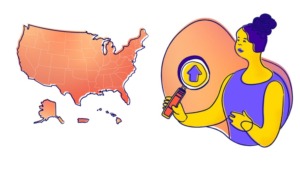New Youth Connections, New York
(All names have been changed.)
I didn’t think much about race until seventh grade, when I joined the gifted class at my school. For the first time, I was the only black person in my class, and I suddenly felt a lot of pressure.
I felt like I wasn’t just representing myself, but all black people. I worried that my classmates didn’t see blacks as individuals, but as a stereotype. I couldn’t make a fool of myself in front of them.
The pressure made me hesitant to speak. What if I said the wrong thing? What if words flew tangled and contorted out of my nervous mouth? I became quiet. I became even quieter when the topic of black people came up. When we talked about slavery in social studies class, I wanted to disappear. Although I didn’t spot any outward signs of racism, I still felt singled out.
My classmates were so cautious around me. When they described black people, they’d pause to search for the best word to use. If they described someone white or Asian, I’d never hear that hesitation. Their self-censorship made me even more uncomfortable.
In my neighborhood, some people reinforced stereotypes about black people. Many of the black teenagers I saw on the bus were rude and obnoxious. They’d jump on the bus seats, shout at the top of their lungs, and pick fights with each other, bothering innocent people who were minding their own business.
I wasn’t rude or a trouble maker, and I didn’t want my people to be seen that way. Many other black kids were like me. Instead of hanging around the block, they read books.
So I decided that it was up to me to show my classmates that not all black people were loud and obnoxious.
In my quest to separate myself from black stereotypes, I began to reject things I identified as black. I didn’t dare pick up a book by Maya Angelou. I avoided listening to hip-hop and R&B. I thought it would help me be more like my classmates.
But no matter how hard I blasted my rock music, it didn’t help me to fit in. My physical differences were too obvious. One day, a white boy made fun of my neatly braided cornrows. At the house of another classmate, I felt even more stigmatized. Her mom was Puerto Rican and her dad was Chinese, so I was shocked when I heard her younger brothers whispering about me.
“Why is she so black?” one said. Another said, “Maybe if she scrubs her skin really hard, it’ll come off.”
I sank deeper and deeper into my rock music. But instead of helping me fit in with the white kids, my music separated me from black people.
One day, I was on the bus going home with two friends, one black and the other Hispanic. One asked what I was listening to, so I gave him my headphones.
“Why are you listening to rock?” he asked. “That’s white people’s music.” I felt my face grow hot, but I didn’t know how to respond.
All these conflicts upset me. I felt too black for the kids in my class and too white for my friends in other classes. Things began to change when I became friends with Jessica in the eighth grade.
“I hate myself,” she’d say. “I’m so black and ugly.”
At first I thought she was just fishing for compliments, but then I realized that she meant what she said.
Seeing how Jessica’s negative thoughts destroyed her self-esteem, I began to wonder if I was doing the same thing to myself. When I re-examined my beliefs, I was shocked to realize that all the stereotypes I thought others believed about black people were things I believed.
When I saw black people lazing on street corners or behaving inappropriately in music videos, I shook my head with disgust. But instead of looking into these situations more deeply, I simply pointed my finger and criticized my people. I had poisoned myself against my race just to fit in with my classmates. I began to think that I was a racist – a racist against my own people.
I decided I couldn’t let my fears decide my behavior or tastes anymore. I began to work hard to see people as individuals instead of as simplistic stereotypes.
It’s taken several years to change my thinking. I still have to deal with ignorance about black people from my white and Asian classmates, and ignorance from black people about my interests. Despite this, I’m committed to being myself instead of trying to represent an entire race. And I’m not going to judge my own race, or any other, based on stereotypes.
©Youth Communication/New York Center. http://www.youthcomm.org.





























